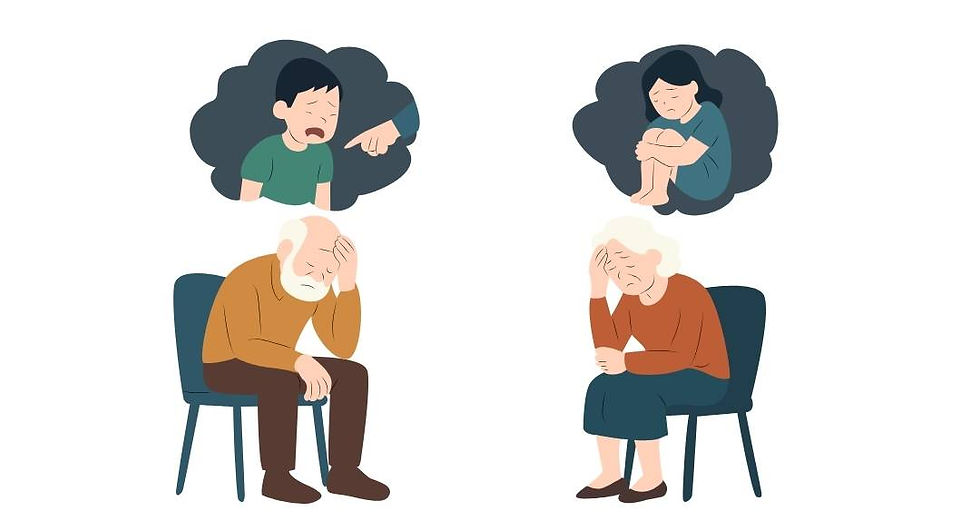Is EMDR an Appropriate Treatment for Me? Exploring the Benefits and Common Reasons for Trauma Therapy
- annabellalipson
- Apr 15, 2024
- 3 min read

If you're grappling with trauma or PTSD, the journey to healing can feel confusing to navigate. What kind of therapist do I need to help me with this issue? What should they specialize in? What treatment modalities should I look for to help me the most?
Each individual's experience is unique, and finding the right therapeutic approach can be challenging. Eye Movement Desensitization and Reprocessing (EMDR) has gained recognition as an effective treatment for trauma-related disorders, but is it the right choice for you?
In this article, we'll delve into the reasons why someone might benefit from EMDR and explore five common factors that lead individuals to choose it as a form of treatment.
5 Ways You May Benefit from EMDR?
Trauma Resolution: EMDR is particularly effective in addressing traumatic experiences. If you've been through a distressing event or series of events that continue to haunt you, EMDR can help you process and resolve these memories, reducing their impact on your daily life.
Symptom Reduction: Individuals with PTSD often experience a range of debilitating symptoms such as flashbacks, nightmares, and hypervigilance. EMDR targets these symptoms directly, aiming to alleviate their intensity and frequency, thus restoring a sense of control and stability.
Improved Coping Skills: EMDR doesn't just focus on processing past trauma; it also equips you with coping mechanisms to deal with present and future challenges. Through the therapy process, you'll learn new ways to manage stress, regulate emotions, and foster resilience.
Enhanced Self-Esteem: Trauma can profoundly impact your self-perception, leading to feelings of shame, guilt, or worthlessness. By reframing negative beliefs and fostering self-compassion, EMDR can bolster your self-esteem and empower you to embrace a more positive self-image.
Holistic Healing: EMDR approaches therapy from a holistic standpoint, recognizing the interconnectedness of mind, body, and spirit. By addressing the physiological, emotional, and cognitive aspects of trauma, it offers a comprehensive path to healing that resonates with many individuals.
5 Common Reasons EMDR Therapy is Chosen as a Form of Treatment:
Evidence-Based Effectiveness: EMDR therapy has a large body of research supporting its efficacy in treating trauma and PTSD. Many individuals are drawn to EMDR because they seek evidence-based interventions that have been scientifically validated.
Non-Verbal Approach: Traditional talk therapy isn't always suitable for everyone, especially for those who struggle to articulate their experiences verbally. EMDR provides an alternative by engaging in bilateral stimulation, allowing for processing without extensive verbalization.
Faster Results: Unlike some forms of therapy that may require months or even years to yield noticeable improvements, EMDR is often praised for its relatively swift results. Many clients appreciate the prospect of making significant strides in a shorter timeframe.
Client-Centered Approach: EMDR places a strong emphasis on the client's autonomy and agency throughout the therapeutic process. By empowering individuals to guide their own healing journey, it fosters a sense of ownership and empowerment.
Versatility: EMDR isn't a one-size-fits-all approach; rather, it can be adapted to suit the unique needs and preferences of each individual. Whether you're addressing a single traumatic incident or complex, longstanding trauma, EMDR offers flexibility in tailoring the treatment to your specific circumstances.
In conclusion, EMDR holds promise as a potent tool for those grappling with trauma and PTSD. If you resonate with the reasons outlined above and are seeking a therapeutic approach that prioritizes holistic healing, evidence-based practice, and client empowerment, EMDR may indeed be an appropriate treatment option for you. However, it's essential to consult with a qualified mental health professional to determine the best course of action based on your individual needs and circumstances. Remember, healing is a journey, and you deserve support every step of the way.
Annabella Lipson is a Licensed Mental Health Counselor at Peaceful Living Mental Health Counseling in Scarsdale, NY.
She enjoys working with young adults & adults who are dealing with grief, constant sadness, anxiety, PTSD and other heavy emotions that make it difficult to enjoy the present moment.
Annabella has an innate ability to make her clients feel comforted and cared for as they confront their grief and loss. She incorporates a combination of Cognitive Behavioral Therapy (CBT), Dialectical Behavior Therapy (DBT), EMDR Therapy, Ego-state Interventions and Mindfulness practices in her counseling sessions.





Comments